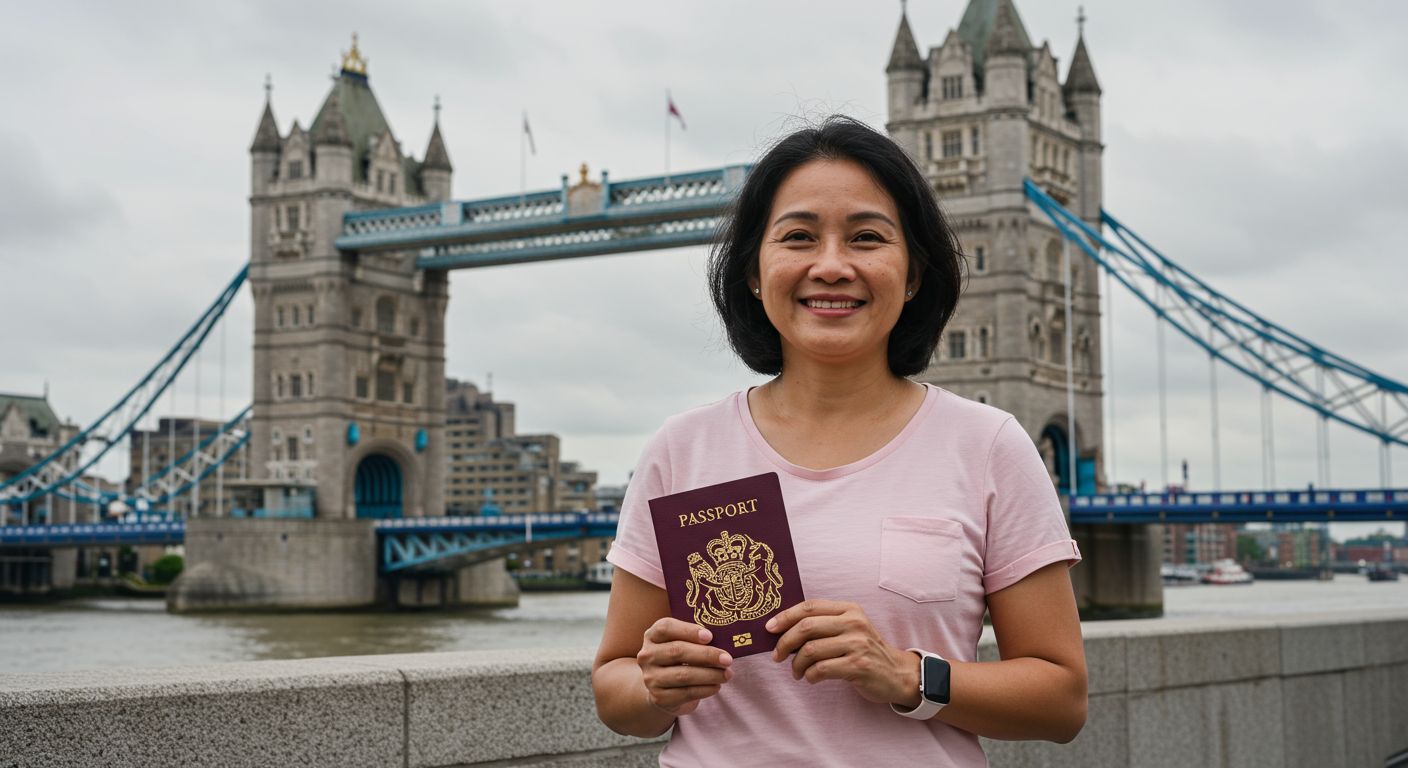How to Apply for Domestic Worker Visa UK: Complete Step-by-Step Guide

Navigating the domestic worker visa UK application process can feel like solving a complex puzzle with constantly changing pieces. The strict eligibility requirements, extensive documentation, and specific timelines make it particularly challenging for those unfamiliar with the UK immigration system.
Fortunately, this comprehensive guide will walk you through every step of the application journey. Whether you’re a nanny seeking a UK visa, one of many Filipino domestic workers hoping to work legally in Britain, or any domestic helper planning your employment abroad, we’ve created a clear roadmap to follow. Many Filipino workers in UK domestic settings have successfully obtained their visas by carefully following these exact procedures.
In this step-by-step guide, we’ll cover everything from understanding the Overseas Domestic Worker visa requirements to preparing your documentation, submitting your application, and knowing your rights once you arrive. Additionally, we’ll provide valuable information about support resources available should you encounter any difficulties during your employment.
Let’s begin by understanding what exactly the Domestic Worker Visa entails and who qualifies for it.
Understanding the Domestic Worker Visa UK
The Domestic Worker Visa UK represents a specific immigration pathway designed for household staff accompanying their overseas employers to Britain. This route comes with distinct features, eligibility criteria, and has undergone significant changes over recent years.
What is the Overseas Domestic Worker (ODW) visa?
First introduced in 2002, the Overseas Domestic Worker visa allows foreign domestic employees to accompany their employers to the UK for a temporary period
This visa specifically caters to individuals providing personal household services, including cleaners, chauffeurs, cooks, nannies, personal carers, and protection staff.
The visa costs £682 and permits domestic workers to stay in the UK for a maximum of 6 months. Currently, holders must return home once this period expires. Furthermore, unlike some other visa categories, the ODW visa does not allow dependents to join or accompany the main applicant.
While in the UK, domestic workers can:
- Travel abroad and return to complete their stay
- Change employers (but only to another domestic worker position)
- Work exclusively as domestic workers in private households
However, they cannot extend their stay beyond the initial 6 months or access public funds.
Who is eligible to apply?
To qualify for the Domestic Worker Visa UK, applicants must meet several key requirements:
- Be at least 19 years old on the application date
- Have worked for their employer continuously for at least 12 months before applying
- Have lived in the same household as their employer or in a property regularly used by them
- Plan to travel to the UK with their employer, the employer’s partner, or children
- Intend to work full-time as a domestic worker in a UK household
- Agree to leave the UK after 6 months or when their employer departs (whichever comes first)
- Be able to support themselves without relying on public funds
Moreover, the employer must be either a British citizen who normally resides outside the UK or a foreign national visiting the UK—both not intending to remain in Britain for more than 6 months. The employer must also commit to paying the domestic worker at least the UK National Minimum Wage.
Key changes since 2012
The ODW visa underwent substantial transformation in April 2012, creating essentially two different systems for domestic workers.
Before April 2012, the visa offered much more flexibility:
- Renewable yearly, potentially leading to settlement after 5 years
- Allowed dependents (spouse and children under 18) to join the worker
- Permitted changing employers without visa complications
After April 2012, the restrictions significantly increased:
- Non-renewable 6-month visa
- Workers initially tied to employers who were also visa sponsors
- No option to bring dependents
- No pathway to settlement
In 2016, minor adjustments were made allowing ODW visa holders to change employers, but still without the ability to renew their visas unless found to be trafficked.
Nonetheless, domestic workers who entered the UK on pre-2012 visas and have remained legally can still benefit from the old system—applying for extensions and potentially settlement after 5 years of continuous residence.
Preparing for Your Application
Successful preparation forms the foundation of any domestic worker visa UK application. Thorough document gathering, understanding contractual obligations, and verifying employer eligibility will save time and prevent frustrating rejections.
Documents you need before applying
A complete application requires several critical documents that must be prepared in advance:
- A current passport or valid travel identification with at least one blank page for the visa
- Financial proof showing you can support yourself during your stay—typically bank statements or payslips covering the previous 6 months
- A completed ‘Appendix Domestic Worker Statement’ signed by both you and your employer
- A letter from your employer confirming your job title, employment duration, and your status as a permanent employee
Additionally, you must provide at least one of these documents covering the same employment period:
- Pay slips or bank statements showing salary payments
- Confirmation of tax paid
- Health insurance payment confirmation
- Employment contract
- Work visa or residence permit from your current country of employment
- Previous visas showing travel history with your employer
Remember that all documents not in English or Welsh require certified translations. Despite appearances, overlooking even minor documentation requirements can lead to application rejection.
Understanding your employment contract
The employment contract forms a crucial part of your application. Consequently, both you and your employer must agree to and sign the written employment contract in the format specified in the Appendix Domestic Worker Statement.
This contract must clearly outline:
- Duration of employment
- Your specific duties
- Working hours and rest periods
- Holiday entitlements
- Travel arrangements to the UK (employer must cover these costs)
- Accommodation arrangements
- Protection of your passport and documents
Perhaps most importantly, the contract must explicitly state you will be paid according to UK National Minimum Wage requirements—currently £12.21 per hour for workers aged 21 and over, and £10.00 per hour for those aged 18-20 (as of April 2025). This guarantee protects your rights and ensures legal compliance.
Checking your employer’s eligibility
Your application depends greatly on your employer meeting specific eligibility criteria. According to UK immigration rules, your employer must fall into one of these categories:
- A British citizen who normally lives outside the UK and does not intend to remain in the UK for more than 6 months, or
- A foreign national visiting the UK who does not intend to stay longer than 6 months
Obviously, confirming your employer’s eligibility status before application submission prevents unnecessary complications. Your employer must provide evidence of their temporary stay in the UK, such as their visa or travel documentation.
Furthermore, your employer carries legal responsibilities toward you throughout your UK employment. They must commit to:
- Paying you at least the National Minimum Wage
- Not forcing excessive working hours
- Providing agreed holiday pay
- Giving proper notice if your employment ends
These employment conditions should be established prior to your arrival, and your employer cannot change them without your consent. Should your employer fail to meet these obligations, you retain the right to take legal action through employment tribunals or civil courts.
Step-by-Step Application Process
The application journey for your domestic worker visa UK begins once all preparation is complete and documents are in order. This straightforward process follows five essential steps, each requiring careful attention to detail.
Step 1: Apply online via the UK government portal
The domestic worker visa application must be submitted online through the UK government website using the ‘Domestic worker in a private household’ form. Importantly, you cannot apply from within the UK—you must submit your application from a country where you have residence rights.
Applications can be made up to three months before your planned travel date to the UK. This early application timing gives you sufficient room to address any unexpected issues that might arise.
Step 2: Pay the visa fee and healthcare surcharge
The application fee for the domestic worker visa UK currently stands at £637-£682. You must pay this fee during the online application process using a credit or debit card.
For domestic worker visas, which typically last six months or less, you don’t need to pay the Immigration Health Surcharge (IHS). This exemption applies specifically to applications made from outside the UK for stays of six months or less. Should your circumstances change, keep in mind that longer stays would require the healthcare surcharge payment.
Step 3: Book and attend your biometric appointment
Upon completing your online application and fee payment, you’ll need to schedule a biometric appointment at your nearest visa application center (VAC). During this appointment, officials will collect your:
- Fingerprints
- Photograph
- Signature
Typically, you must bring your appointment confirmation (with QR code), valid passport, and other required documents. Family members included in your application must attend together, with children under 16 accompanied by their designated responsible adult.
Step 4: Submit supporting documents
After your biometric appointment, you’ll need to submit your supporting documents. Depending on your location, you can either:
- Upload them to the online portal
- Have them scanned at your appointment
- Mail them to the processing center within five days of your biometric appointment
Always include your current passport with at least one blank visa page. For documents not in English or Welsh, certified translations are mandatory.
Step 5: Wait for a decision
Once your application is complete with biometrics and documents submitted, the standard processing time is approximately three weeks. The processing clock starts from the day you provide your biometrics at the visa application center.
For those needing faster processing, priority services are available for additional fees:
- Priority service: Decision within 5 working days (£500)
- Super priority service: Decision by the next working day (£1,000)
You’ll receive notification of the decision via email or through your UKVI account. It’s generally unnecessary to contact UKVI about your application status if it’s still within standard processing times.
What Happens After You Arrive in the UK
Upon arrival in the UK with your domestic worker visa, you’ll first encounter a Border Force officer who will check your visa and may ask about your reasons for coming to the UK. Provided your circumstances match those stated on your visa application, you’ll be permitted entry.
Your rights and limitations under the visa
Once admitted, your domestic worker visa grants you specific rights and imposes certain limitations. You can:
- Work full-time in your employer’s private household
- Travel abroad and return to the UK (within your 6-month period)
- Change employers to another domestic worker position
- Retain your personal identification and travel documents
Nevertheless, you cannot:
- Work in any capacity other than as a domestic worker in a private household
- Extend your stay beyond the initial 6 months
- Access public funds or social benefits
- Bring dependents into the UK on the same visa
As a domestic worker, you’re entitled to the National Minimum Wage, regular breaks, appropriate working hours, and holiday pay. Your employer must honor the employment conditions agreed upon before arrival and cannot change these terms without your consent.
What to do if your employer is abusive
Everyone in the UK has the right to be treated respectfully, regardless of nationality or immigration status. In cases of immediate danger, contact the police by dialing 999. Although some workers fear reporting abuse due to immigration concerns, your safety should remain the priority.
Importantly, the UK offers protection through the National Referral Mechanism (NRM) for victims of trafficking or modern slavery. Once referred to this system (usually by a “First Responder” organization), you may receive support including accommodation while your case is evaluated.
Organizations like Kalayaan and Acas provide free, confidential advice specifically for domestic workers. These services are available regardless of your immigration status and operate independently from government authorities.
How to change employers legally
Unlike the pre-2012 system, the current domestic worker visa allows you to change employers without notifying the Home Office. This right is crucial for protecting workers from exploitation.
When changing employers, remember these key points:
- You can only work as a domestic worker in another private household
- The change must occur during your visa’s validity period
- Your new employment must still comply with UK minimum wage requirements
- You cannot extend your stay beyond the original 6-month period
The ability to change employers offers vital protection, allowing you to leave difficult situations without becoming undocumented. This provision exists precisely because of the power imbalance that can occur in domestic employment relationships.
Support and Legal Resources for Domestic Workers
Numerous support networks exist specifically for holders of the domestic worker visa UK, providing crucial assistance with legal, employment, and welfare concerns. Domestic workers facing difficulties can turn to these resources immediately after arrival or at any point during their stay.
Charities and community groups that can help
Several organizations offer free and confidential support to domestic workers:
- Kalayaan: Provides immigration advice, English classes, and specialized support for trafficking victims. Contact them at 0207 243 2942 or email info@kalayaan.org.uk.
- Voice of Domestic Workers: Offers emergency accommodation, education, community activities, and practical support. They provide counseling, doctor referrals, and job placement assistance.
- FDWA-UK: Founded in 2013 to help victims of abuse and exploitation, offering information about workers’ rights.
How to access legal advice
Free legal guidance is available through:
- Acas helpline: Offers confidential employment rights advice.
- Citizens Advice: Provides free immigration guidance if they have specialist advisers available.
Legal aid is accessible if you’re experiencing domestic abuse, seeking asylum, or are a trafficking victim.
Understanding the National Referral Mechanism (NRM)
The NRM is the UK’s framework for identifying and supporting trafficking victims. Once referred by a “First Responder” organization:
- The Single Competent Authority makes an initial “Reasonable Grounds” decision.
- If positive, you receive safe accommodation, financial support, legal representation, emotional help, and NHS access.
- For immediate danger, call police at 999.
Kalayaan can register you as a client and assess your circumstances for NRM referral.
Conclusion
Navigating the UK domestic worker visa process requires careful attention to detail and thorough preparation. The 6-month visa offers valuable opportunities for domestic workers while imposing specific limitations that applicants must clearly understand before proceeding.
First and foremost, gathering all required documentation proves essential for a successful application. Your employment contract, proof of previous work relationship, and financial evidence create the foundation for your submission. Additionally, verifying your employer’s eligibility status helps prevent unexpected complications during the review process.
The step-by-step application journey involves several critical stages: completing the online form, paying applicable fees, attending biometric appointments, submitting supporting documents, and patiently awaiting a decision. Though standard processing typically takes three weeks, priority services remain available for those facing time constraints.
Once in the UK, domestic workers enjoy certain rights despite temporary status. Most importantly, you can change employers if necessary without jeopardizing your legal standing. This provision exists specifically to protect workers from potential exploitation or abuse.
Support networks stand ready to assist should difficulties arise during your stay. Organizations like Kalayaan, Voice of Domestic Workers, and FDWA-UK offer specialized guidance tailored to domestic workers’ unique circumstances. Legal resources and the National Referral Mechanism provide additional protection for those facing serious mistreatment.
The domestic worker visa system has undoubtedly become more restrictive since 2012, especially regarding renewal options and settlement pathways. Nevertheless, this visa category continues to create legitimate opportunities for domestic workers accompanying employers to the UK. Thorough preparation, clear understanding of contractual obligations, and awareness of available support resources ultimately empower domestic workers to make informed decisions throughout their UK employment journey.
References
→ https://www.gov.uk/government/publications/overseas-domestic-workers-supporting-documents/leaflet-for-persons-coming-to-the-uk-as-an-overseas-domestic-worker
→ https://www.gov.uk/overseas-domestic-worker-visa
→ https://ezvisas.com/uk-domestic-worker-in-a-private-household-visa-your-guide-to-stress-free-summer-travel/
→ https://www.kalayaan.org.uk/about-us/what-we-do/
→ https://www.gov.uk/overseas-domestic-worker-visa/eligibility
→ https://www.daniellecohenimmigration.com/work/overseas-domestic-worker-visa/
→ https://www.gov.uk/guidance/visa-processing-times-applications-outside-the-uk
→ https://www.richardnelsonllp.co.uk/guides/overseas-domestic-worker-visa/
→ https://www.gov.uk/overseas-domestic-worker-visa/documents-you-must-provide
→ https://freemovement.org.uk/how-to-apply-for-a-uk-domestic-worker-visa/
→ https://www.davidsonmorris.com/domestic-worker-visa/
→ https://www.gov.uk/overseas-domestic-worker-visa/your-employment-rights
→ https://www.gov.uk/overseas-domestic-worker-visa/apply
→ https://immigrationbarrister.co.uk/how-to-apply-for-an-overseas-domestic-worker-visa/
→ https://www.gov.uk/healthcare-immigration-application/who-needs-pay
→ https://www.gov.uk/ukvcas
→ https://www.gov.uk/government/publications/usa-apply-for-a-uk-visa/apply-for-a-uk-visa-in-the-usa
→ https://immigrationbarrister.co.uk/uk-visa-processing-decision-waiting-times-2025/
→ https://immigrationbarrister.co.uk/personal-immigration/other-work-visas/overseas-domestic-worker-visa/
→ https://www.thevoiceofdomesticworkers.com/
→ https://tinig-uk.com/filipino-domestic-workers-who-is-supporting-you
→ https://www.citizensadvice.org.uk/immigration/get-help/get-immigration-advice/
→ https://www.kalayaan.org.uk/for-workers/victims-of-trafficking-and-modern-slavery/


